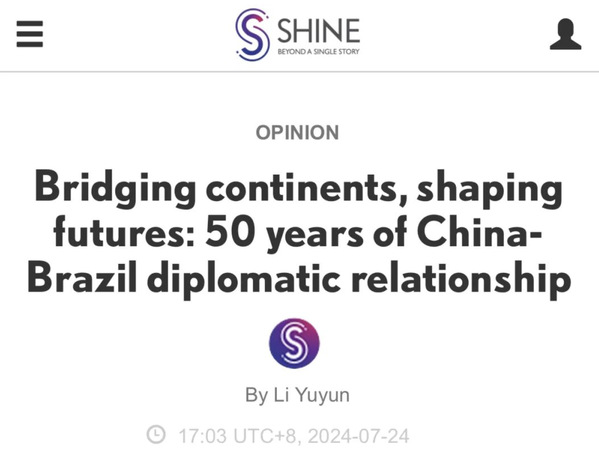作者:Li Yuyun 发布时间:2024-08-16 来源:SHINE+收藏本文


Li Yuyun is a policy analyst at the Fudan Development Institute and a part-time researcher at the Research Office for Latin American Studies at Fudan University.
Despite the vast distances between them, China and Brazil share common economic and developmental goals and geopolitical visions.
The two countries are celebrating the 50th anniversary of diplomatic ties this year. Since establishing diplomatic relations in 1974 and upgrading them to a strategic partnership in 1993, followed by an upgrade to a comprehensive strategic partnership in 2012, the deepening of this connection has contributed to their international stature.
The partnership has demonstrated an increasingly close developmental trajectory while also injecting new dynamism.
China and Brazil, as leading emerging economies in Asia and Latin America, play crucial roles in fostering a more stable and balanced global order. The two countries maintain close dialogue and coordination on major international issues, through platforms such as the China-Brazil High-Level Coordination and Cooperation Committee, the Foreign Ministers' Comprehensive Strategic Dialogue, and the China-Brazil Business Council. These diplomatic channels enhance mutual understanding of global affairs. Both share a broad consensus on promoting a more equitable global governance system and increasing the voice and representation of emerging economies.
The burgeoning relationship has become a model for South-South cooperation. The amicable cooperation extends beyond bilateral to multilateral levels. Mechanisms like the BRICS, the G20, and international organizations such as the United Nations, help address global economic governance, climate change, and sustainable development. China and Brazil, as key BRICS members, have helped emerging markets and developing countries speak out internationally. This has significantly contributed to reforming the international financial system and achieving balanced global economic development.
The strategic partnership between China and Brazil relies on economic and trade cooperation. Bilateral trade and investment across many economic sectors show a multi-dimensional development pattern.
Trade between China and Brazil has grown steadily. China became Brazil's greatest trading partner in 2009, while Brazil became China's top economic and trade partner in Latin America, displaying strong structural complementarity. China's industrial production relies on Brazil's soybeans and iron ore. China's machines and electronics meet Brazil's diverse requirements. This complementarity optimizes resource allocation and encourages industrial upgrading and transformation in both nations.
Investment cooperation is another important factor. Initially focused on traditional sectors such as energy and minerals, investment grew to include industry, agriculture, financial services, and technology innovation. Notably, Chinese investments in Brazil are becoming more localized, integrating into local communities and supporting local development. Brazilian corporations are researching renewable energy, biotechnology, and other promising industries in the world's second-largest economy.
The booming digital economy has also expanded Sino-Brazilian commerce and economic collaboration. E-commerce platforms make it easier for small and medium-sized businesses from both countries to enter each other's marketplaces, driving bilateral trade growth.
On the back of political trust and economic cooperation, technological innovation is propelling the China-Brazil partnership. Sino-Brazilian technology collaboration has made substantial advances in aircraft, climate change, forestry, and energy since 1982. The Earth Resources Satellite Project and the Nanotechnology Research Center are landmark collaborations.
Brazil and China have built a strong platform for increasing their relationship based on practical experience. For instance, China and Brazil have complementary resources and technological advantages in green technology.
Brazil has plentiful clean energy, whereas China excels in photovoltaics, wind power, and energy batteries. Practical collaborations have shown that this complementarity works. By July 2023, China General Nuclear Power Group had engaged in two massive wind power projects in Brazil. In 2023, BYD, a leading Chinese new-energy vehicle manufacturer, announced plans to build a large production site in Brazil, boosting bilateral green technology industrial chain collaboration.
China and Brazil have strategic and top-level strategies to promote technological innovation. Brazil has implemented initiatives like the Growth Acceleration Program (Programa de Aceleração do Crescimento) and industrial policy since the Lula administration took office in 2023. These initiatives aim to drive economic transformation and achieve sustainable development goals within transportation, urban construction, energy, and education.
These strategic measures, as well as China's Belt and Road Initiative and Global Development Initiative, have overlapping goals, demonstrating technical cooperation synergies. This convergence has established a solid institutional base and policy backing for Sino-Brazilian science and technology diplomacy.
As China and Brazil mark 50 years of diplomatic relations, it is a time to celebrate both past accomplishments and the bright future. Looking ahead, the two countries intend to strengthen their cooperation even more. This emerging dynamic between these two countries will open the path for innovative solutions to global challenges through shared expertise and coordinated projects, benefiting both communities and contributing to a more interconnected world.
(The author is a policy analyst at the Fudan Development Institute and a part-time researcher at the Research Office for Latin American Studies, Fudan University)